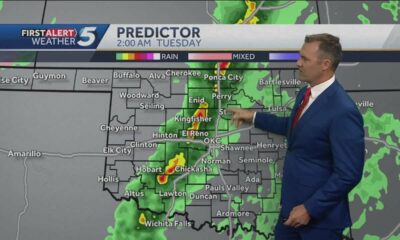Mississippi Today
‘A real twisted animal’ in Holly Springs: What’s next for the spiraling power provider

April Guest remembered seeing the outline of her breath appear inside her Ashland home. During the nights after the 2023 winter ice storm hit north Mississippi, the 68-year-old bunkered down under a table she repurposed into a hut, walling off the cold with her blankets.
“Just to get up to go to the bathroom felt like an Arctic quest,” Guest recalled. “It felt like just doing that could take my life.”
During the days, she stayed with her neighbor, whose oil lamp kept them warm in the single-digit chills. Then she returned to take refuge under the table in the house where she lives alone. It took five days, she said, for the power to finally come back on, although for some the outages lasted about twice as long.
The ice storm was a rare event for a state that often has mild winters. But the reality for Guest and about 12,000 others in the area is there’s no telling when the next power outage will strike, rain or shine. After all, they’re customers of the Holly Springs Utility Department. For Guest, this wasn’t her first rodeo in the dark.
Her late husband, who died in 2021, relied on an oxygen machine after his esophagus ruptured from a surgery gone wrong, Guest said, leading to constant bouts with pneumonia. On at least one occasion, she remembered, they had to call for an ambulance because a power outage outlasted their supply of spare oxygen tanks.

The constant outages are a financial hazard, too. Guest said she’s “lost more food than I care to count,” and power surges that rattle electric connections have cost her two air conditioners and a refrigerator. Hedging future losses, Guest now uses a dorm-sized fridge. Soon, she hopes to flee the home she’s had for the last 43 years.
“The prospect of the winter coming, it’s just too much to bear,” she said in early December.
Most customers of the Holly Springs Utility Department, including Guest, live outside the Holly Springs city limits. After hearing years of complaints about the utility’s issues, lawmakers last session passed a bill that could lead to the power provider losing those customers, a financial blow for a relatively poor city that relies heavily on income from the utility.
Using the authority granted in that bill, the Mississippi Public Service Commission scheduled a hearing for 10 a.m., Jan. 7 to decide if the utility department has provided “reasonably adequate” service. If it’s not convinced, the PSC can then petition a judge to put those customers’ electric service under a receiver.
On Monday, though, the city of Holly Springs asked the state Supreme Court to delay the hearing because its lead attorney, Sen. Braford Blackmon, has to attend the first day of the 2025 legislative session, also on Jan. 7. The court hasn’t yet weighed in.
The Tennessee Valley Authority, which provides wholesale power to the utility, said that none of its 153 local partners has had issues like the Holly Springs Utility Department.
“We’re in uncharted territory,” Melanie Farrell, TVA’s vice president of External Strategy and Regulatory Oversight, told the PSC at a hearing last year.
But for the utility’s customers, the chaos has become all too familiar.
“It’s a real twisted animal down here,” described Gene Crews, a power customer who lives just north of Holly Springs. “It’s just crazy we live in a modern day society with all this gee-whiz technology, and these dumbasses can’t keep the lights on. It’s just bewildering, to say the least. Just bewildering.”

‘We knew this day was coming’
Holly Springs, once the home of Mississippi legends like Ida B. Wells, Junior Kimbrough and R.L. Burnside, elected its first woman mayor in 2021. Former city Alderwoman Sharon Gipson won the seat after advocating to reform sentencing laws and lower utility bills.
While the spotlight on the Holly Springs Utility Department has grown the last few years, many officials who worked for or with the city maintain that the current administration inherited a utility department that was already suffering from years of inadequate investment.
“We knew this day was coming,” said Michael Howell, the utility’s electric superintendent who’s been with the department since 1981, at a hearing in 2023 months after the ice storm. He said they’ve long needed to upgrade electric poles, power lines and transformers. “We talked about it years ago.”
Howell talked about the “often” “sunny day” outages that happen because the department isn’t maintaining its rights-of-way, or the areas around power lines where vegetation like tree branches and kudzu grows. He also described the utility’s bleak staffing. At the time, it had five or six linemen – including one, George Humphreys, who was in his 80s and had spent 66 years with the utility – covering an 1,100-mile service area, he said, when ideally it should have had somewhere from 30 to 40.
One of the officials hosting the hearing, then-state Rep. Chris Brown, posed a hypothetical to Howell: “If we don’t upgrade the system and we don’t give it the resources that it needs, do you think that the system will collapse one day?”
“It’s collapsing now,” Howell said, as scattered applause broke out among locals in the room. In all, he estimated it would take a decade to address all of the utility’s issues.
Since 1935, Holly Springs has bought wholesale power from the Tennessee Valley Authority, a federal entity created by the New Deal in 1933 to bridge gaps in rural electricity access. Now, TVA sells power to 153 local power companies, serving over 10 million people. While TVA maintains some oversight over their finances, the local utilities are largely independent otherwise. Even before partnering with TVA, Holly Springs was a connector for nearby rural areas.

“Holly Springs stepped up to the plate and extended power,” said Rep. John Faulkner, D- Holly Springs.
Over the years, the Holly Springs Utility Department grew its coverage area into five different counties, including a small portion of Tennessee, and now about 8,000 of its customers live outside the city, Faulkner said.
While its reach has spread, the utility’s control remains entirely with the Holly Springs mayor and board of aldermen. That means about two-thirds of ratepayers can’t vote for anyone running the department.
“It’s taxation without representation,” Donald Hollingsworth, the mayor of nearby Byhalia, said, noting that the utility collects a payment in lieu of taxes from the areas it serves.
Anecdotally, customers told Mississippi Today that the utility’s outages have become more frequent in the rural areas outside of Holly Springs. While they describe the outages becoming more regular in the last five years, the degree of the utility’s challenges came to light after the 2023 ice storm.
The 2023 storm took out over 20,000 power connections across north Mississippi, according to the Mississippi Emergency Management Agency. But “while power was quickly restored in most counties,” the Holly Springs Utility Department struggled to bring its customers back on line, a MEMA report said. It didn’t fully restore power until 11 days after the storm hit, according to TVA.
“When my refrigerator is going out, and I lose all them groceries, I have to pay to replace them. No one’s paying me back. Nobody’s bringing me water to flush my toilets,” Becky Brown, whose home gets water through an electric well pump, said at another public hearing in 2023. “I have to go to a gas station with jugs to fill up with water to bring back to my house so we can use the bathroom, or wash our hair in the sink. And that’s sad.”
Brown and others spoke in a packed Rust College auditorium. A single mother, she described waking up throughout the night to top off the gas in her small generator and to put extra blankets over her children. Her kids, Brown said, would use her cellphone hotspot to do their homework because, living in a rural area, they didn’t have access to broadband internet. But when the power goes out, so do the cellphone towers.

Another speaker, Betsy Irmischer, described going nine days without power. On the eve of Valentine’s Day, Irmischer’s husband took a fall in the dark, she said. The next day, in an ambulance on the way to an airlift, he passed away.
In fiscal year 2023, TVA said it received 2,000 customer complaints between its 153 local partners, about five times the amount it gets during a normal year. Seventy percent of those came from the Holly Springs utility’s service area.
Never has one of those local power suppliers struggled financially on the level that this one has, TVA’s Director of Regulatory Assurance Sharon Williams told Mississippi Today. As of late October, Williams said Holly Springs was over a million dollars behind in its payments to TVA, and the city had to make partial payments for each of the last three months. The city also owed $2.4 million to vendors, some of which had warned the city they would soon stop working.
“Best we can tell in all of our history, no (other local power company) has ever had a payment returned for insufficient funds in their account,” she said, adding that the city was nearly four years behind on its requirement to send annual audits of the utility to TVA.
After the storm, the state commissioned a study evaluating the utility department’s condition. Tom Suggs, former chief operating officer for Middle Tennessee Electric, led the study and gave a candid review to the PSC the following January.
“There’s just a glaring lack of knowledge about the most basic things a utility system manager would know,” Suggs said. “We’re at the point of trying to start an electric utility from scratch.”
He said there was an outage each of the seven days of his inspection, despite there not being “a cloud” in the sky. Other problems he noted: no routine maintenance, no safety briefings, no one calculating system losses, and service requests going as long as two years before being fulfilled. People buying homes in the area, Suggs added, have come close to losing their bank’s financing waiting for the utility to add them to the grid.
State officials listened in amazement at the hearings. Multiple times, they posed a question hoping to better learn how all of this happened: “Where is the mayor?” No one knew.

Political reluctance
In just her first term, Holly Springs Mayor Sharon Gipson has repeatedly butted heads with her city’s staff and board members.
In June 2023, the mayor filed an assault charge against a police department employee, alleging the employee slammed a door on her as she tried to enter a department meeting. Prior to the meeting, court records describe, Gipson got into a “heated disagreement” with and suspended the police chief. Just two months later, the city’s human resources director, who Gipson had also previously suspended, filed an assault charge against the mayor, alleging she pushed her inside City Hall. Neither set of charges held up in court.
In August, she suspended utility General Manager Wayne Jones, who the city hired in the spring. The board voted to reverse the move later that day. Gipson also once called Jones “insubordinate” during a board meeting after he requested access to city audits, and posted on the city’s Facebook page that she was opposing Jones’ recommendation to increase rates.
The five-member board has also come after Gipson: Citing frustration with delays over infrastructure projects, the aldermen voted in September to cut Gipson’s salary in half. The mayor vetoed the action.
“The egregious and illegal actions of this ‘Board of Bullies’ have been an unfortunate hindrance to the development of this community,” Gipson said in another Facebook post. “Despite the antics of the Board of Aldermen, my administration has been successful in many areas, and we will continue to move the City forward.”
Mississippi Today made repeated attempts, spanning over two months, to reach Gipson for this story, but none were answered.
Before the city hired Jones, no one was officially in charge of running the utility for over a year, including during the 2023 ice storm. During that time, Gipson was the de facto general manager. The lack of a department head hindered the response to the 2023 ice storm, a TVA report said, and the state had to appoint someone from a neighboring utility to act as Holly Springs’ point person.

“They’re operating day to day, there’s no long-term vision or planning or anything like that going on,” Suggs said of the department during that period.
A variety of people who’ve worked with the system pointed to the influence of politics in managing the system as at least part of why Holly Springs is where it is.
TVA, which said its attempts to help have largely gone “unanswered” by city leadership, has repeatedly recommended the city increase rates to keep up with inflation and to make necessary improvements. While TVA has raised its wholesale rate twice in the last two years, Holly Springs hasn’t raised its rates since 2009.
Gipson, who campaigned on lowering rates, said in one of her Facebook posts that raising rates isn’t necessary, and that the department can make up for lost revenue once it corrects its issues reading meters. But TVA disputed that notion in a presentation to Holly Springs officials in October, saying a rate increase would be necessary regardless.
Bill Stone, a former state representative and the utility’s general manager from 2017 to 2021, admitted that politics got in the way of raising rates while he was with the city.
“Because of the political environment, (there was) a reluctance to keep the rates up with inflation,” Stone said, explaining that the utility’s rates were just above average when he was there. “I guess we were all complicit in that because we were under so much pressure because everybody talked about how high the rates were.”
Faulkner, the state lawmaker from Holly Springs, was the city’s chief of staff under the previous mayor, Kelvin Buck. He echoed Stone’s reflection.

“If I had to point to one thing from the eight years when Mayor Buck was in office that probably should have been done was raise the rates,” he said. “I remember us taking pride in not having to raise rates.”
Tim Liddy, a former alderman for the city who recently announced he’s running against Gipson for mayor next year, said it was hard to broach the subject when voters constantly brought up how high their bills were. Liddy pointed to the city’s older housing stock and median household income that’s about $8,000 less than the rest of Mississippi.
“A lot of these people don’t have efficient housing, and a lot of them are lower income,” he said. “So no matter what the utility rate is, (the bill is) always high.”
Hollingsworth, the Byhalia mayor, worked for the city for nearly four decades, including five years as the utility’s general manager. When asked how much of the utility’s issues he blames on politics, he said, “100%,” explaining that decisions over hiring and firing at the department have to go through the Board of Aldermen.
Faulkner and Stone, who worked for the city at the same time, said they believe their administration was getting the utility back on the right track – during those years, the utility built a new substation in Ashland and hired a contractor to cut the service area’s rights-of-way. But Gipson, they said, got rid of both Stone as general manager as well as the rights-of-way contract.
While acknowledging the current leadership inherited an already struggling utility, Faulkner said the mayor has to take some accountability.
“You’re saying because you did not inherit a system with brand new poles and transformers, that’s why we’re having outages? That’s not true,” he said, wondering why Gipson didn’t replace the rights-of-way contract. “How about all the things the previous administration handed to you? (We) gave you the playbook. Just keep running the plays.”
Others, like Hollingsworth, wondered if TVA shouldn’t share some part of the blame.
“As far as the regulatory side, TVA is falling down on it because the higher-ups at TVA are more interested in selling power than they are managing the system to see that (the local utilities are) running it right,” he said, arguing that TVA gave too much to the city and should have instead established the utility department as a cooperative system.
Jones, the utility’s current general manager, agreed that other parties, such as the state and federal governments, bear some responsibility.
“We didn’t get here by ourselves,” Jones said. “It’s the responsibility of the mayor and the Board of Aldermen as far as HSUD is concerned…however TVA has oversight over the area. As much as it is the local utility’s responsibility to manage the utility, it’s also incumbent on TVA and the state of Mississippi and the federal government to see to it that people receive power.”
And getting out of the mess, he added, will take funds that the utility can’t raise on its own. TVPPA, a nonprofit that represents TVA’s local partners, estimated Holly Springs needs over $10 million just to restore its rights-of-way and as much as $15 million to fix its substations.

In an interview with Mississippi Today, Williams with TVA said the organization believes in the “strength of local control” over its partner power systems, and that Holly Springs’ crisis doesn’t reflect poorly on the broader model.
“By all accounts, this is an extreme outlier and an example of when local control is not the benefit that we would like to see for all their customers,” Williams said. She also said TVA didn’t have a role in the Holly Springs department’s expansion over the years, and that those decisions were made on the state and local level.
Faulkner said he plans to introduce a bill in the 2025 legislative session that would create a utility board to run the department, giving every county that the utility serves the ability to appoint board members.
“It takes it out of the hands of this mayor and any future mayor of the city so that the utility department can no longer be used as a political football,” he said.
In addition to Gipson, Mississippi Today sent dozens of interview requests through phone calls, texts and emails over several months to each of Holly Springs’ five board members. One alderman turned down a request, another never responded, and the others agreed to schedule later interviews but then stopped responding.
This reporter approached one alderwoman, Patricia Merriweather, in person at a board meeting to ask for an interview. As she walked into an executive session, Merriweather replied, laughing, “After the election.”
This article first appeared on Mississippi Today and is republished here under a Creative Commons license.![]()
Mississippi Today
Mississippians honor first Black lawmaker since Reconstruction
Mississippians honor first Black lawmaker since Reconstruction

Former Mississippi Rep. Robert Clark Jr. lay in state Sunday in the Capitol Rotunda as family, friends, officials and fellow citizens paid respect to the first Black legislator in the state since Reconstruction.
Clark, a Holmes County native, was elected to the House in 1967 and served until his retirement in 2004. He was elected speaker pro tempore by the House membership in 1993 and held that second-highest House position until his retirement.
The Senate and House honored the 96-year-old veteran lamaker last week.

“Robert Clark … broke so many barriers in the state of Mississippi with class, resolve and intellect. So he is going to be sorely missed,” Lt. Gov. Delbert Hosemann said last week.
Hosemann was among those who came Sunday to honor Clark. So did House Speaker Jason White, who like Clark hails from Holmes County.

Clark was the only Black Mississippian serving in the Legislature from until 1976 and was ostracized when first elected, sitting at a desk by himself for years without the traditional deskmates. But he rose to become a respected leader.
An educator when elected to the House, Clark served 10 years as chair of the House Education Committee, including when the historic Education Reform Act of 1982 was passed.
Clark served as the only Black Mississippian serving in the Legislature from 1968 until 1976.
“He was a trailblazer and icon for sure,” White said last week.




This article first appeared on Mississippi Today and is republished here under a Creative Commons license.![]()
Mississippi Today
On this day in 1912

March 9, 1912

Charlotta Bass became one of the nation’s first Black female editor-owners. She renamed The California Owl newspaper The California Eagle, and turned it into a hard-hitting publication. She campaigned against the racist film “Birth of a Nation,” which depicted the Ku Klux Klan as heroes, and against the mistreatment of African Americans in World War I.
After the war ended, she fought racism and segregation in Los Angeles, getting companies to end discriminatory practices. She also denounced political brutality, running front-page stories that read, “Trigger-Happy Cop Freed After Slaying Youth.”
When she reported on a KKK plot against Black leaders, eight Klansmen showed up at her offices. She pulled a pistol out of her desk, and they beat a “hasty retreat,”
The New York Times reported. “Mrs. Bass,” her husband told her, “one of these days you are going to get me killed.” She replied, “Mr. Bass, it will be in a good cause.”
In the 1940s, she began her first foray into politics, running for the Los Angeles City Council. In 1951, she sold the Eagle and co-founded Sojourners for Truth and Justice, a Black women’s group. A year later, she became the first Black woman to run for vice president, running on the Progressive Party ticket. Her campaign slogan: “Win or Lose, We Win by Raising the Issues.”
When Kamala Harris became the first Black female vice presidential candidate for a major political party in 2020, Bass’ pioneering steps were recalled.
“Bass would not win,” The Times wrote. “But she would make history, and for a brief time her lifelong fight for equality would enter the national spotlight.”
This article first appeared on Mississippi Today and is republished here under a Creative Commons license.![]()
Mississippi Today
On this day in 1977
On this day in 1977
March 8, 1977

Henry L. Marsh III became the first Black mayor of the former capital of the Confederacy, Richmond, Virginia.
Growing up in Virginia, he attended a one-room school that had seven grades and one teacher. Afterward, he went to Richmond, where he became vice president of the senior class at Maggie L. Walker High School and president of the student NAACP branch.
When Virginia lawmakers debated whether to adopt “massive resistance,” he testified against that plan and later won a scholarship for Howard University School of Law. He decided to become a lawyer to “help make positive change happen.” After graduating, he helped win thousands of workers their class-actions cases and helped others succeed in fighting segregation cases.
“We were constantly fighting against race prejudice,” he recalled. “For instance, in the case of Franklin v. Giles County, a local official fired all of the black public school teachers. We sued and got the (that) decision overruled.”
In 1966, he was elected to the Richmond City Council and later became the city’s first Black mayor for five years. He inherited a landlocked city that had lost 40% of its retail revenues in three years, comparing it to “taking a wounded man, tying his hands behind his back, planting his feet in concrete and throwing him in the water and saying, ‘OK, let’s see you survive.’”
In the end, he led the city from “acute racial polarization towards a more civil society.” He served as president of the National Black Caucus of Elected Officials and as a member of the board of directors of the National League of Cities.
As an education supporter, he formed the Support Committee for Excellence in the Public Schools. He also hosts the city’s Annual Juneteenth Celebration. The courthouse where he practiced now bears his name and so does an elementary school.
Marsh also worked to bridge the city’s racial divide, creating what is now known as Venture Richmond. He was often quoted as saying, “It doesn’t impress me to say that something has never been done before, because everything that is done for the first time had never been done before.”
He died on Jan. 23, 2025, at the age of 91.
This article first appeared on Mississippi Today and is republished here under a Creative Commons license.![]()
-

 News from the South - Louisiana News Feed4 days ago
News from the South - Louisiana News Feed4 days agoRemarkable Woman 2024: What Dawn Bradley-Fletcher has been up to over the year
-

 News from the South - Oklahoma News Feed2 days ago
News from the South - Oklahoma News Feed2 days agoFeed the Children rolls out new program to help Oklahoma families
-

 News from the South - Oklahoma News Feed3 days ago
News from the South - Oklahoma News Feed3 days agoMarch 6,2025: Rain and snow on the way
-

 News from the South - Virginia News Feed7 days ago
News from the South - Virginia News Feed7 days agoProbation ends in termination for Va. FEMA worker caught in mass layoffs
-

 News from the South - Texas News Feed4 days ago
News from the South - Texas News Feed4 days agoTravis County DA failed to meet deadline to indict murder suspect | FOX 7 Austin
-

 News from the South - North Carolina News Feed6 days ago
News from the South - North Carolina News Feed6 days agoConfederate monument in Edenton will remain in place for now
-

 Mississippi Today5 days ago
Mississippi Today5 days agoKey lawmaker reverses course, passes bill to give poor women earlier prenatal care
-

 News from the South - Oklahoma News Feed7 days ago
News from the South - Oklahoma News Feed7 days agoTimeline: Storms bring a risk of tornadoes, damaging winds to Oklahoma (March 3, 2025)
















































